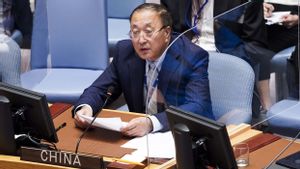JAKARTA - Did you know that crows can help humans maintain cleanliness? Including intelligent birds, crows in Sweden are trained to pick up cigarette butts scattered on the streets.
In Södertälje near Stockholm, Sweden, birds are recruited to help tackle this persistent litter problem. A program designed by startup company Corvid Cleaning rewards crows, with a small amount of food for every cigarette butt they collect. This provides positive reinforcement that encourages this intelligent bird to repeat the behavior.
Crows can do work, share knowledge, and even mourn their deaths. Several studies have shown that they could be the smartest animals on the planet besides primates with a level of reasoning equivalent to that of a seven-year-old child.
Crows were chosen for the job precisely because of their intelligence, the man behind the innovative idea, Christian Gunther-Hanssen, told Swedish news agency TT.
"They are easier to teach and there is also a higher chance for them to learn from each other. At the same time, there is a lower risk of them eating the wrong garbage", he explained quoting Euronews February 2.

He continued, the birds participated in this program voluntarily.
Cigarette butts are the most abundant form of plastic pollution in the world. Currently, The Keep Sweden Tidy Foundation says these persistent bits of plastic pollution make up about 62 percent of waste.
The city of Södertälje alone spends around 20 million Swedish Krona (IDR 31,475,563,900) on street cleaning every year. Günther-Hanssen believes training crows could cut the city's cigarette cleaning costs by up to 75 percent.
The estimated cost of picking up each cigarette butt is about 12 cents, he says using a crow would instead reduce this to just 3 cents.
VOIR éGALEMENT:
And this isn't the first time crows have helped with the litter problem. In 2018, the Puy du Fou amusement park in western France taught crows to pick up cigarette butts and other small debris, in exchange for food.
The idea stems from the garden eagle display, where birds pick up roses and carry them to a 'princess' in a castle.
At the time Nicolas de Villiers, head of the park, told AFP it was also about showing "that nature can teach us to take care of the environment."
The English, Chinese, Japanese, Arabic, and French versions are automatically generated by the AI. So there may still be inaccuracies in translating, please always see Indonesian as our main language. (system supported by DigitalSiber.id)


















